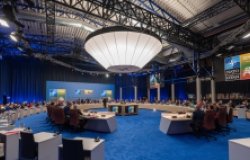Montenegro With or Without Serbia: the Future of Regional Stability and European Integration
SRDJAN DARMANOVIC, Head of the Political Science Department, University of Montenegro and Director of the Centre for Democracy and Human Rights
Overview
Montenegro With or Without Serbia: the Future of Regional Stability and European Integration
April 21, 2005
Staff-prepared summary of the EES discussion with Srdjan Darmanovic, Head of the Political Science Department, University of Montenegro and Director of the Centre for Democracy and Human Rights
Contrary to popular belief, the idea of Montenegrin independence is not something that was invented in the last ten years, but has been going on for more than a century. Srdjan Darmanovic asserted that it is important to keep this historical context in mind before confronting the issue and its implications today. The most recent attempt by Montenegro to break from the so-called "rump" Yugoslavia was initiated in 1997 in opposition to Slobodan Milosevic's government. After he was ousted, Montenegro continued to push for independence, but talks with the democratically-elected Serbian leadership failed. As a result, the international community (most notably, the EU) intervened and defended maintaining the status quo in the region. The country changed its name to Serbia and Montenegro and, in line with the 2002 Belgrade Agreement, will delay voting on the status of Montenegro until 2006.
Darmanovic is critical of the strict voting guidelines prescribed by the Agreement, which do not allow the government any flexibility in timing the vote according to the dynamics of politics in the region. Without the ability to influence the vote, we may all be very surprised by the outcome. According to opinion polls conducted in Montenegro, proponents for independence are consistently ahead of the unionists, with 44.5 percent in favor of independence and 40.5 percent in favor of the union with Serbia. But the margin is quite small. Moreover, pro-Serb opposition to Montenegrin independence is unorganized and failed to win widely in local elections. Thus, the trend seems to favor independence, but not strongly.
Despite the seemingly close race between independence-supporters and unionists, Darmanovic contends that the vote does not pose a security risk and that there is little prospect for violence surrounding the vote. First, although it has supported unionists politically and financially, Belgrade is unwilling to take the combative stance it had in the 1990s. Moreover, according to the post-Milosevic Kostunica-Djukanovic agreement, the Montenegrin government must approve all military deployments to Montenegrin territory.
The EU is an important player in this debate. Its policy has been to support union, but judiciously has advocated a democratic process (the referendum) to determine Montenegro's status. Current law requires that referenda must be supported by the majority of 50 percent + 1 of the electorate in order to pass. This poses a double challenge to proponents of the union: they must not only raise the level of support for union in the electorate, but they must also convince the electorate to go to the polls.
Looking at the results of polling on other important issues, Darmanovic points out that there are interesting social cleavages that are associated with the independence versus union debate. For instance, there is a strong correlation between proponents of independence and those who support NATO integration, full cooperation with the ICTY and EU accession. Paradoxically, therefore, Darmanovic asserts that if the EU gets its way and the referendum results in maintaining the union of Serbia and Montenegro, it will support the part of the electorate that opposes further European integration.
Hosted By

Global Europe Program
The Global Europe Program is focused on Europe’s capabilities, and how it engages on critical global issues. We investigate European approaches to critical global issues. We examine Europe’s relations with Russia and Eurasia, China and the Indo-Pacific, the Middle East and Africa. Our initiatives include “Ukraine in Europe” – an examination of what it will take to make Ukraine’s European future a reality. But we also examine the role of NATO, the European Union and the OSCE, Europe’s energy security, transatlantic trade disputes, and challenges to democracy. The Global Europe Program’s staff, scholars-in-residence, and Global Fellows participate in seminars, policy study groups, and international conferences to provide analytical recommendations to policy makers and the media. Read more
Thank you for your interest in this event. Please send any feedback or questions to our Events staff.










